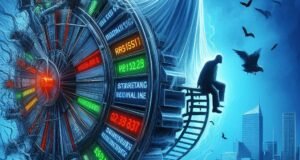Imagine a soldier returning from battle—not with physical scars, but with decisions to review, moments to unpack, instincts to question. In the quiet of the debrief room, he lays down his weapons and picks up a pen, replaying every move. Victory or defeat, the real learning starts after the fight.

This is the spirit of Post-Trade Emotion Analytics in the world of prop trading.
While the markets are a battleground of numbers and algorithms, beneath the surface lies something far more human: emotion. Fear, greed, hesitation, overconfidence—these aren’t just abstract ideas. They’re measurable patterns that shape outcomes just as much as data does. And for serious prop trading firms, ignoring emotion is like ignoring gravity.
The Emotional Debrief
In a high-frequency, high-stakes trading environment, performance is often evaluated by metrics—P&L, Sharpe ratio, drawdown. But what if your worst loss didn’t come from your strategy—but from your state of mind?
That’s where Post-Trade Emotion Analytics steps in—not as a therapist, but as a mirror. It helps prop traders look beyond the chart to assess how they felt, why they acted, and what emotional patterns preceded success or failure.
Did a trader chase a reversal after a big loss due to frustration? These questions matter—and they leave digital fingerprints.

Objection 1:
“Isn’t emotion subjective? How can you measure something so intangible?”
Response:
You measure it the way a pilot measures turbulence—not directly, but through its effects.
Prop trading systems are now integrating journaling apps, biofeedback tools, facial recognition, keystroke analysis, and even self-reported emotional tagging after each session. Combine this with trading data, and you begin to see correlations:
- Stress spikes before position sizing errors
- Calm sessions correlate with disciplined risk management
- Excitement often precedes deviation from planned entries
Emotion may be abstract—but behavior is not. And in proprietary trading, behavior is where psychology meets performance.
Objection 2:
“Shouldn’t traders be emotionless machines? Isn’t feeling the enemy?”
Response:
Feeling isn’t the enemy. Unacknowledged feeling is.
Top prop traders don’t eliminate emotion—they track, understand, and adapt to it. They know that emotional patterns are part of their edge—or their weakness. Post-Trade Emotion Analytics provides a structured way to turn self-awareness into strategic insight.
It’s like checking your pulse after a marathon. The data doesn’t make you weaker—it shows you where to grow.
The Metaphor of the Black Box Recorder
Picture every trader like an aircraft in flight. The trades are the altitude changes, the wins are smooth skies, the losses are turbulence. But what really matters is the black box recorder—the tool that logs every flicker of emotion, every panic-induced decision, every gut call.
Post-Trade Emotion Analytics is the black box of prop trading. And reviewing that box—daily, weekly, monthly—becomes the gateway to higher accuracy, better decision hygiene, and fewer repeated mistakes.
A Competitive Advantage in Prop Trading
In the cold logic of prop trading, it may seem strange to turn inward. But this internal awareness is what separates elite discretionary traders from the average. When you can quantify not just what you did, but why you did it, you begin trading not just the market—but yourself.
And the ROI? Massive. A single realization—like recognizing you take excessive risk after a loss—can preserve capital more effectively than any indicator.
Some firms even gamify emotion tracking, rewarding traders not just for profits but for sessions where decisions aligned with plan and emotional control remained steady.
Markets are mirrors, yes—but distorted ones.Post-Trade Emotion Analytics is the mirror that tells the truth—not during the heat of battle, but in the stillness that follows.
And for modern prop trading desks, this truth isn’t soft science—it’s a performance lever.
Because in the pursuit of alpha, knowing your system is important. But knowing yourself? That’s where the real edge lives.




